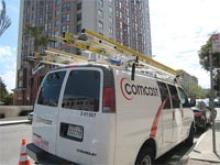Image


I made very clear to the gentleman I spoke with that I thought Comcast’s data cap policy was arbitrary, unfair, and extremely irritating… and that if I had any decent competitive options in the neighborhood I’d dump Comcast in a heartbeat. Since I don’t, I listened to him read his canned warning that if I exceeded their cap again I’d be cut off again.Bear in mind that when you fill up the fuel tank in your car, you are at a gas station that is regularly inspected by the state to ensure it is correctly measuring the volume of gas dispensed. Comcast is not similarly regulated and we have to take Comcast's word on how much traffic we use. Most of the time I have visited Comcast's meter to see what my household usage is, I have been unable to even access it. But back to the story, our Seattle friend later found that he had unintentionally violated the cap again, despite taking precautions not to:
The Customer Security agent was polite, and after the standard identification questions notified me I was cut off for a year due to exceeding Comcast’s Acceptable Use Policy limits on their bandwidth cap. I asked for details on what had been using bandwidth, and again, Comcast would not share. In a sudden brainstorm, I then asked whether the 250 GB bandwidth cap applied to just downloads (which I had assumed, as the majority of most bandwidth used in households is downstream bandwidth), or download and upload bandwidth. Surprise, surprise! Comcast measures both upstream and downstream bandwidth – and it suddenly clicked for me. I’m a photographer and audiophile. I shoot all of my pictures in RAW format, and I store the many hundreds and hundreds of CDs I’ve purchased over the last 20 years or so in a variety of lossless and lossy music formats. … This stuff is valuable to me, and I recently purchased a three-year subscription to Carbonite so I could back all of this content up to the cloud. I also recently saw Amazon’s announcement of being able to upload unlimited M4A/AAC tracks to their Cloud Drive service, and decided to upload my library there so I could access it when on the road. And it turns out uploading all of this content to the cloud triggered Comcast’s bandwidth cap and caused me to be cut off from the internet – again.This is what you can expect from Comcast, which is only growing in power and influence. They have a flawed meter that is poorly understand by their customers (is it measuring up or down or both?) and will provide you will no help in the event they believe you have exceeded your allotment. This is exactly why communities need to consider building their own networks that are directly accountable to the community. Photo used under Creative Commons license, courtesy of Titanas on flickr.
